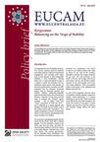The EU’s Rule of Law Initiative in Central Asia
The EU’s Rule of Law Initiative in Central Asia
Author(s): Rico Isaacs
Subject(s): International Law, Government/Political systems, International relations/trade, Politics and law, EU-Legislation
Published by: CEPS Centre for European Policy Studies
Keywords: European Union; Central Asia; law initiative; rule of law; EU regional projects; modernization of legal sector; transitional states;
Summary/Abstract: The EU’s Rule of Law Initiative is one of three EU regional projects in Central Asia, first set out in the EU’s Central Asia Strategy in 2007, as a flagship engagement aimed at linking political priorities to practical assistance in the region. The Initiative is intended, on the part of the EU and member states, “to support on-going modernisation of the legal sector, as part of a more comprehensive strategy to foster and consolidate stability, prosperity and respect for human rights in Central Asian countries”. Rule of Law is now being viewed as a key policy goal amongst international development actors. Economic growth, political modernisation and the ability to attract foreign investment hinges, in part, on strengthening rule of law in transitional states. Since the collapse of the Soviet Union, the Central Asian countries of Kazakhstan, Kyrgyzstan, Tajikistan, Turkmenistan and Uzbekistan have developed legal systems that contain some newly introduced elements of Western law, residual vestiges of the Soviet legal system and elements of traditional practices and customs.
Series: EUCAM - Policy Brief
- Page Count: 6
- Publication Year: 2009
- Language: English
- Content File-PDF

